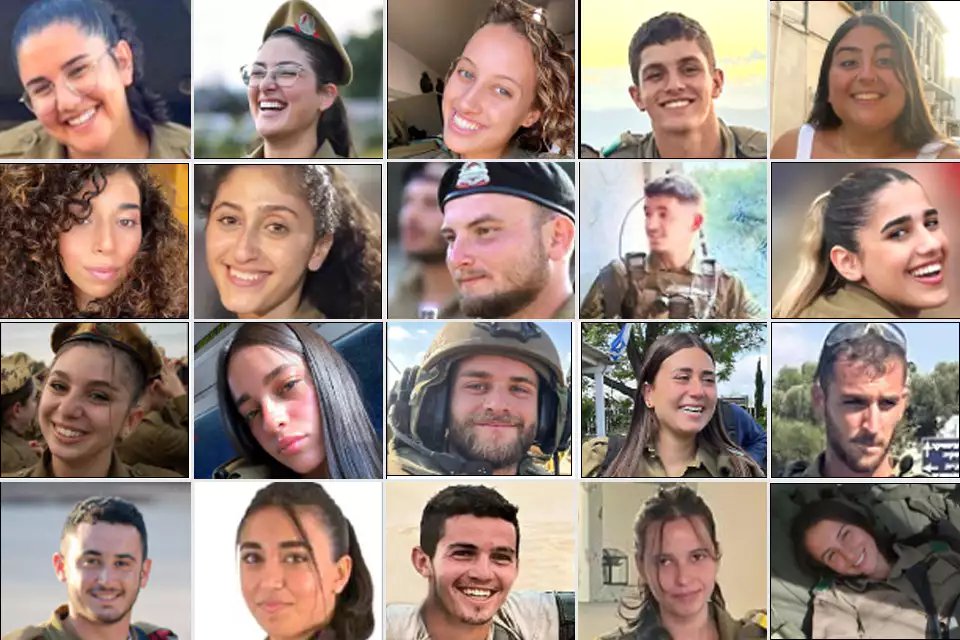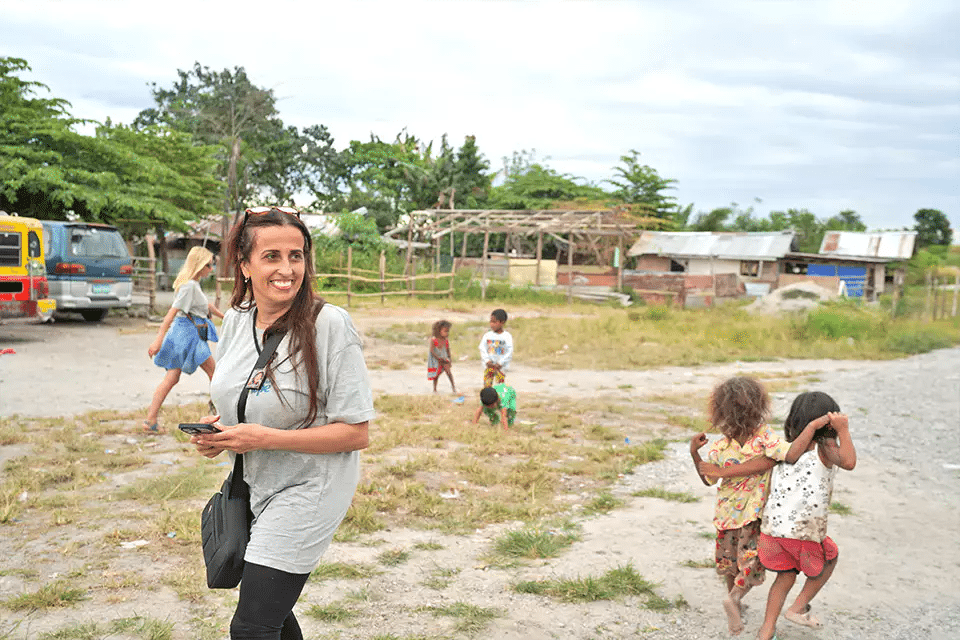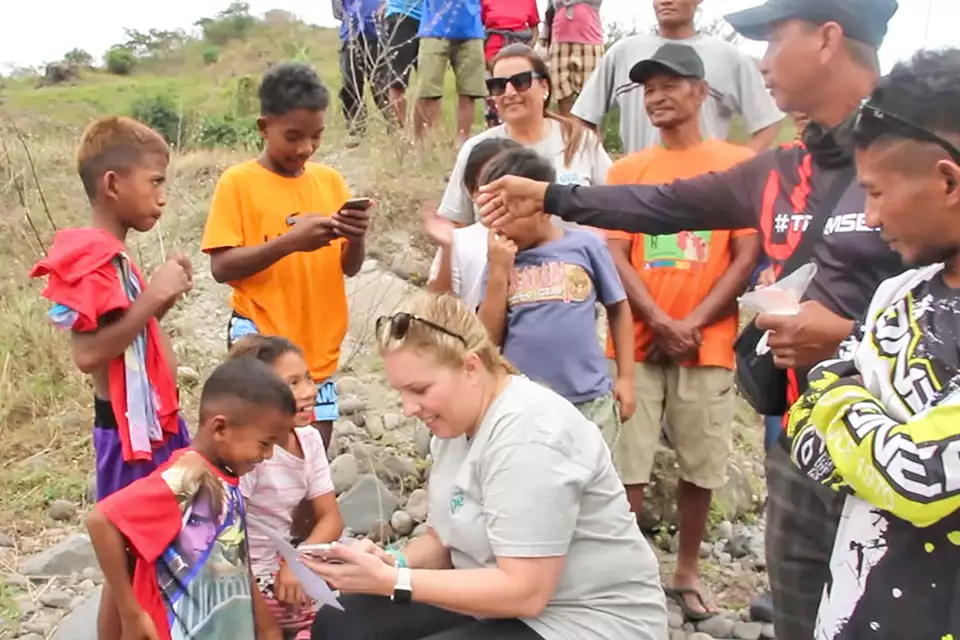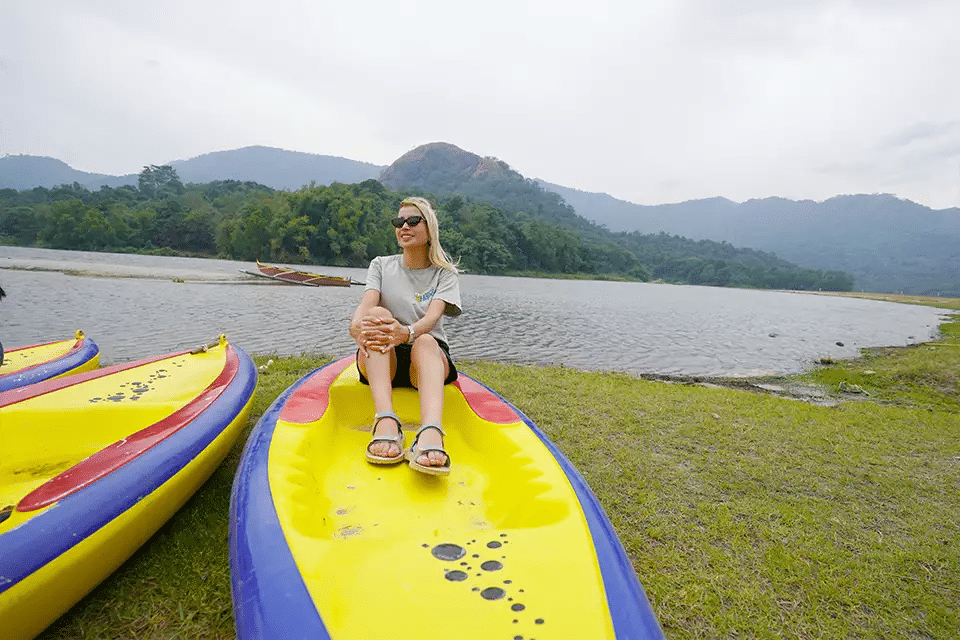In a small village on Luzon Island in the Philippines, where the ancient Aeta tribe sustains itself through agriculture, 20 Israeli bereaved mothers arrive after a challenging off-road journey crossing rivers, rocks, and steep ascents.
As the meeting with the warm-hearted tribespeople concludes, Adva, mother of Staff Sergeant Noam Abramovich who was murdered at Nahal Oz outpost on October 7, takes the wheel of the jeep and begins the steep descent back.
Suddenly she brakes and asks Tom Rosenthal, mother of Sergeant Afik Rosenthal, sitting in the back seat, to replace her because the slope seems threatening. Adva exits the jeep, and I follow to photograph the tropical landscape. She's forgotten to put the jeep in park, and it begins rapidly rolling downhill with Frida, Tom, and Tali inside – all women who lost their children during that Black October.

Sharp screams from Adva and Tom pierce the surrounding silence. In a split second, I must decide – photograph the incident or run after the rolling vehicle to try to stop it. I choose to abandon my camera and rush toward the driver's seat, but Frida beats me to it. She extends her long leg and presses the brake pedal. The jeep stops at the fence, a split second before it would have flipped over. The team extracts it without damage, and now Tom sits behind the wheel.
"Adva, we've discovered you're afraid of dying," Tom says. Adva replies: "I'm afraid of pain. Be precise." Tom: "I screamed my soul out. I don't want to die." Frida laughs: "Just when I chose life."
When did you choose life? I interject in the conversation. Frida: "I haven't chosen yet. I'm surviving day by day. For now." Tom: "At first, I couldn't even cry. But at Afik's funeral, I wore white. It was an act of defiance. I won't be in black. During shiva, a friend gave me the phone number of Shira Yavetz, mother of Yiftah Yavetz, who was killed. Afik died while treating wounded Yiftah. I called and asked her, 'Do you want to choose life with me?' and Shira answered, 'Yes, yes, yes' and asked that we video call. Since then, we've been choosing life. A good life."
Adva: "In my previous life, I told myself I could handle anything except the death of a child, which is why I don't give importance to things like a potential jeep rollover. Nothing happened, we continue."
"Accelerate on the uphill. Gas, gas," comes the instruction from guide Noya over the radio on how to cross the river. The jeep sputters but finally reaches the opposite bank, and they continue their conversation.
Adva: "My Noam wrote: 'A person is responsible for finding meaning in their life.' This has become our mission. Our role as parents is to ensure what happened is never forgotten. When reading about the Yom Kippur War, we understand it was the bereaved parents who led social change."
Frida: "We must not forget what was before October 7. If we don't do something for unity among our people, it's as if my child died for nothing. Even if he saved an entire kibbutz, there will be another October 7."
Why did I say "yes"?
Since October 7, I haven't left Israel's borders. I don't judge those who travel, but personally, I couldn't enjoy the wonders of Paris while hostages remain shackled in tunnels without seeing daylight. I couldn't dream of the Northern Lights while our soldiers risk their lives on all fronts.
That's why I surprised myself when I said "yes" to Yifat Yeger, a psychotherapist specializing in trauma and resilience, who called to ask if I'd be willing to photograph the world's first off-road journey of bereaved mothers heading to the Philippines. There are moments when my mouth works much faster than my brain. I agreed to the proposal long before considering what I would need to face. Because it's not just about positioning my GoPro in front of a shark's mouth, or how to photograph four women in a sputtering jeep.
I thought that by listening to and documenting these mothers and their stories about daughters and sons who won't return, I wouldn't really be enjoying myself "fully." I hadn't considered what it would mean to listen to 20 mothers who experienced the worst possible tragedy. Some haven't slept for a year and five months. Others haven't returned to work. All have a deep hole in their hearts.
Twenty mothers whose fates were intertwined on October 7 embarked on this journey. Among them were mothers of female lookouts who were in the command center on the morning of the attack and were the first to identify, report, and direct forces: Sharon Eshel, mother of Corporal Roni Eshel; Tzameret Haim Pour, mother of Sergeant Shirel Haim Pour; Gili Leibushor, mother of Corporal Yael Leibushor; Tiki Barzilay, mother of Corporal Osher Simcha Barzilay; and Anat Glass, mother of Sergeant Yam Glass, who commanded the lookout team.

Joining them were mothers of lookouts who were trapped in a concrete shelter that failed to protect them: Sigal Price, mother of Sergeant Noa Price; Sari Ashram, mother of Corporal Shay Ashram; Ilanit Cohen, mother of Private Hadar Miriam Cohen; Adva Abramovich, mother of Private Noam Abramovich; Keren Amar, mother of Private Shirat Yam Amar; Ilana Nissani, mother of Sergeant Shahaf Nissani; and Adi Marciano, mother of Private Noa Marciano, who was kidnapped wounded from the shelter and murdered in captivity by Hamas. They were joined by Sharon Nimri, mother of Captain Eden Nimri, team commander in the "Sky Rider" unit, which was armed and fought fiercely against terrorists outside the shelter.
Mothers of seven fallen IDF soldiers also participated: Tom Rosenthal, mother of Sergeant Afik Rosenthal, and Shira Yavetz, mother of Captain Yiftah Yavetz; Shalhevet Harush, mother of Sergeant Ido Harush; Adi Golan, mother of Sergeant Yoni Golan; Frida Marciano, mother of Sergeant Itai Eliyahu Marciano; Tali Mishaelof, mother of Sergeant Gal Mishaelof; and Ilit Ben Nun, mother of Captain Shlomo Ben Nun.
Twenty mothers. Twenty stories of entire worlds cut short. Longing and indescribable pain against the backdrop of tropical landscapes and physical and emotional challenges.
Yifat Yeger explains the rationale behind the journey: "One thing that characterizes traumatic experiences is that they sever life. We're going on a long, continuous journey where everyone who joins will face challenges. My expertise is in journeys that involve emotional and mental processes. This isn't a retreat or a weekend in London. It's a long journey. Something happens every day."
Adva: "The word 'journey' contains 'go' [in Hebrew]. I know this from my previous life. I know journeys create movement in the soul, and I came to try. First, to distance myself from Israel to get closer to myself and try to create some movement in my soul that might help me say to myself, 'Well, so much has been ruined, so let's make one small decision and try to take it somewhere positive.' That's my hope from this journey."
The "interconnected parents" law
I'm surprised to discover that Ben Gurion Airport hasn't changed. It's even bustling with life in a somewhat disturbing way. The journey team includes Liat Lehavi, representing the foundation and donors; Liat Sade-Sternberg, CEO of the foundation; Noya Sagiv, literature doctoral student and guide; Dina Promovitz, social companion; Dr. Drorit Attias, journey physician; and Liora Haninovitz, logistics manager. The women are already at Gate 32, our meeting point, handling final arrangements.
It all began when Adi Marciano and Sharon Eshel sat on a bench waiting for their daughters, sisters of Roni and Noa, who were being interviewed for a bereaved siblings delegation. "Then they thought, 'Wait, what about the mothers?'" recalls Gili Leibushor, one of the journey's initiators. "They called me from the bench and said, 'We need a challenging off-road journey for mothers.'"
Sharon, Adi, and Gili, like the other parents of the lookouts, met on October 7 during those difficult hours when they gathered every bit of information about their daughters' fate. They became a community that initiates memorial activities, promotes investigation committees and social changes. But above all, it's a community that supports its members. "It's the law of bereaved parents, like the law of communicating vessels, so it's the law of interconnected parents," Gili explains their strength.
"Sometimes someone is up and lifts those who are down, sometimes it's the opposite and it balances out. For me personally, these connections and this support are among the things that have helped me most in getting through this terrible year. It's easiest to be with women like me, bereaved mothers. One look, and everyone understands. One word, and no explanation is needed."
About a month after the phone call where the journey idea was raised, a walk was held in the Gaza border communities. Liat Lehavi, for whom Yael was a babysitter for her children, joined Gili on the walk.
Gili: "She asked me, 'What can I do to help you?' I told her, 'We want to go on a journey.' Liat replied, 'What do you want to happen on this journey?' I said, 'I want to laugh. I'm not laughing. Maybe there's a chance that in this place I'll laugh.'"
"I want to show my children that I've overcome, that I'm fighting for them. They're proud of me, of my battle," shares a mother from the delegation.
The mothers approached Journey4Hope, a foundation that supports the rehabilitation of victims of the Iron Swords War through resilience and leadership journeys. The journey itself was produced by Magma, a company specializing in organizing off-road expeditions.
The foundation was established by Sade-Sternberg, who explains: "In the army, I was a casualties officer. But what suited bereaved mothers I knew in the 1990s is not suitable for women in 2025." With the foundation's help, donors were found who understood that these mothers, who for almost a year and a half had only given of themselves to their families and communities, would receive the resilience they needed – and the date was set.
If I had submitted this story as a screenplay, it wouldn't have passed any review committee. The timing seems artificial. After months of planning, 20 bereaved mothers take off, 12 of them mothers of lookouts or operations sergeants who fell on October 7 in the command center and the shelter from which lookouts Karina Ariev, Naama Levy, Liri Albag, Daniella Gilboa, and Agam Berger were kidnapped. The day before the flight, four of the lookouts return to Israel, while Agam Berger would be released when they are in the midst of their journey.
For some participants, the decision to join was complex. Shira Yavetz shares: "I didn't go to support groups and didn't meet bereaved families, and I even said I hate being with bereaved mothers. Before Yiftah fell, I was both Yiftah's mother and a thousand other things. When they invited me to join, I got a bit anxious and worried they would bring me down."
Sigal Price was concerned about the physical difficulty: "I can't do such journeys, but they (Sharon Eshel and Gili Leibushor) told me 'we'll be with you,' and they didn't give up." Tiki Barzilay also hesitated, but when Tzameret Haim Pour called and said she needed her by her side, she didn't hesitate: "I told her, 'For you, I'll do it.'"
Communication
Only about ten percent of the thousands of Philippine islands are inhabited. Most residents live on Luzon Island, where our journey begins. Traveling in a convoy of jeeps requires using radios to overcome road obstacles and report problems. Among themselves, they don't need devices to identify an issue. During the instruction on the radios, a seemingly simple technical action, Gili notices that Sharon Eshel, standing next to Sigal, is shedding a tear, and quickly approaches to embrace her.
On the morning of October 7, Corporals Yael and Roni were the first to report Hamas's attack. From the recordings the IDF provided to the families, one can clearly hear the two reporting from the first minute until contact was lost.
At 6:29 AM, Yael reported: "I see four people descending toward the fence, confirm receipt!" and Roni simultaneously: "Diego stations receive, four people running toward the fence, confirm receipt." For 25 minutes, they report on fence events moment by moment, until Yael says with sober understanding, "They're inside the outpost." Afterward, the terrorists disabled the systems.
Gili approaches Liat Sadeh, explaining that the radio devices are a difficult trigger for them.
"We didn't come to enjoy"
From the jeep window, an urban landscape is visible. Narrow alleys, sparse grocery stores, banana stalls, barefoot children running from place to place. "It reminds me of Gaza. A third-world country. Look at their houses, how they hang their laundry," says Adi Marciano to her jeep companions Sharon Nimri, Ilanit, and Anat.

They wave to the barefoot children. Adi: "Did Hadar tell you about the dogs in Nahal Oz?"
Ilanit: "Hadar used to feed them."
Adi: "Noa loved animals very much. One of the first pictures she sent me from the outpost was of dogs. They were instructed by their commanders not to touch them for fear of diseases, so they would feed them."
Ilanit: "The female dogs would escape from Gaza and come to give birth under the containers. Hadar wanted to adopt a puppy."
Adi: "They even cared for Gaza's dogs."
"It's only hard for me because Noa was kidnapped and we could have gotten her back," says Adi Marciano.
The jeep convoy leaves the urban area and heads onto a dirt road. The vegetation is sparse, reminiscent of reeds. Thin cows stand by the roadside. The jeeps race across flowing water, splashing everywhere. Through the window, women can be seen using every water source, large or small, for laundry – beating colorful clothes and drying them on rocks.
If I thought it would be difficult to talk with them about the disaster and their children, from the first moment of the journey I realized I was wrong. They describe every moment of that Saturday. Who wrote which message and to whom. Who stood where in the shelter. They compare information. I'm part of one long conversation that began upon boarding the plane, continued through meals, plays in the jeep, and seems now that it will never end.
We arrive at a hot spring, and they put on swimsuits and immerse themselves, enjoying this beautiful natural resource. And the stories? They continue even in the water. Leaving the water, Shira and Ilana spontaneously dance with local children, joined by Tom, Ilanit, Shalhevet, and team members.
Gili winks at them: "We didn't come to enjoy." Shira responds with a smile: "Today we pretended it's October 6."
Signs
Ilana, Sari, Tiki, and Tzameret share a jeep with guide Noya. "Release for drive," Noya explains to Ilana about the jeep before they set out for a long drive to the Pacific Ocean. Ilana has never driven outside of Ashkelon. "They won't believe me at home," she says.
Three weeks after October 7, when casualty officers knocked on Tiki's door, it wasn't the first time for her. Her brother was killed in the army in a car accident and her eldest daughter was critically injured in a hit-and-run. After her brother's death, her parents died young. She chooses to fight the desire to fall apart. In the jeep, she's responsible for maintaining good spirits and puts "Even Better" on the playlist. They sing and clap. Tzameret's smile suddenly changes to a grimace of crying, seemingly without reason.
Sari turns to Tzameret: "You, with God's help, will have a good day. We're with you all the way."
Tzameret hasn't slept since October 7. Even her cocktail of pills no longer affects her. "Someone is with me here, like a madman not knowing where to go, when I felt alone you threw me a sign," Tiki sings with singer Benaia Barabi. "I want you to photograph this," requests Ilana, pointing to the black speaker device that has writing on it that looks like the word "Shahaf" in Hebrew. "I asked Shahaf for a sign that she's with me, and then I got into the jeep and saw this. She told me, 'I'm here with you on this trip.'"
Tiki takes out a sticker with Osher's picture that says "always smiling" and attaches it to the car's air freshener shaped like a smiling face. "See, Osher is with us here too. Telling me, 'Be happy. Smile. Enjoy.' Tzameret was very sad this morning at the hotel, and suddenly white butterflies appeared and surrounded us. I told her, 'Here's Shirel, she wants you to enjoy a little. Tzameret, smile.'"
"Look, look, there's Shahaf in the sky," Ilana draws our attention. "Signs are when you find something that's not in its natural place. There's no sea here. Seagulls don't fly here. That's Shahaf."
We stop for lunch at a lake formed after the eruption of Mount Pinatubo in 1991. The serene, pastoral view doesn't reveal the drama that unfolded here years ago.
Ilana gets out of the jeep: "I'm not letting anyone else drive. I'm enjoying this, I'm enjoying this."
While Liora prepares food for them, Noya plays guitar. The short break extends because one of the vehicles is malfunctioning and they're waiting for it to be repaired. At the lakeside, Adva cries. "At this hour I used to text with Noam every day." I'm armed with a camera. To be precise, with three cameras that distance me from committing a transgression, which means tears that might blur the focus. I continue photographing. Adva: "I haven't slept for four nights. With everyone's stories and photos of all the children, it's like I've gone back to October 7 with intense pain in my heart. I hoped nature would work its magic on me, and it's not happening. But the moment I started understanding things about myself, I'm already glad I came."
I can no longer hold back my tears. It trickles down, and the camera's focus becomes blurred. I turn off the camera and embrace her.
Why are you glad you came?
"Suddenly I've developed the desire – or understanding – that I need to start rebuilding, that I have no choice. The question is whether I can create meaning in my life. I'm living on autopilot and making a tremendous effort for my children." Adva left her job as VP of human resources and established the "In Noam's Way" foundation, which promotes educational programs encouraging young people to integrate into public service.
When the jeep malfunction is fixed, we continue to the ocean. I return to Adva, Frida, Tom, and Tali's jeep. Back in Israel, a wave of hostage releases begins, including lookout Agam. Tali checks the emergency app, sees Gadi Moses being released and gets emotional. "I'm shocked, he looks good, Keith will look like that too." Keith Siegel is a mental health representative, and Tali is his manager. "I don't think he knows about Gal. He always said Gal, the soldier, was protecting him."
Frida also opens a news app and reports: "Three will arrive from one place, and Agam from another." The silence that falls in the jeep is pierced by Gili's report on the radio: "All Magma stations receive, this is the mothers of the lookouts. Agam Berger, on her feet, is in the hands of the Red Cross, all the girls are coming home. Confirm receipt."
Gili has overcome the trigger of the radio devices, but the great challenge now lies before all of them. The jeep creaks, and Tali bites her lips, "She looks good, how wonderful," and adds: "If only for us. I wish Gal was wounded and I could move to live next to his bed in Soroka Hospital." Joy mixes with pain. She cries. "It's hard for me with this finality that some will return and some won't."
Tom: "I'm happy for their happiness, but it hurts." Adva: "For a year I've been saying I wish Noam was kidnapped." Tom: "I don't know what the result of that would be." Adva: "She's returned to her mother's arms." Tom: "As I knew him, Afik would have shot himself in the head if he were kidnapped."
An unplanned stop in the middle of the Santo Tomas riverbed because the malfunctioning jeep has broken down again. Keren cries and Dina, the social companion, hugs her – her daughter and Agam were best friends. The released crying is contagious. Everyone hugs and tears up.
Ilana: "The last photo Shahaf sent was from Karina's phone in the shelter, a picture of the two of them that said 'Living.' I'm waiting to return to Israel and meet her; she can tell me exactly what happened in those final minutes."
Adi Marciano tears up: "It's only hard for me because Noa was kidnapped and we could have received her like they returned. It didn't happen for us. It's a feeling of missed opportunity, disappointment, anger, sadness. It's difficult for me to accept that she's not coming home."
As with many unexplained things on this journey, suddenly a double rainbow appears in the sky. Adi marvels. "For me, a rainbow is a greeting from our daughters," her voice chokes, "and that they're happy Agam has gone home and they're also sending us a hug."
An hour later, right at sunset, they finally reach the Pacific Ocean and allow themselves to unwind. Dina plays ABBA's "Dancing Queen" on the amplifier, and through their tears, they begin to dance.
Adi Marciano shouts to the sea: "Noa, mom is making a scene!" And Sharon Eshel reinforces her: "Roni, mom is embarrassing herself!" Adi screams: "Noa, I love you," and adds: "That's it, I've released it."
Symbol of massacre
When the malfunctioning jeep is replaced with a white Toyota pickup – a symbol of the massacre – they note it and move on. Tiki wants Tzameret to drive too, and brings her a pillow from the hotel room to improve her seating. It works. Tzameret drives.

Lighting Shabbat candles in a forest clearing on Friday evening challenges them anew. The relationship with God has become complicated to nearly impossible. Tzameret: "I cook, but there's no Kiddush, no holidays. Nothing."
Ilana: "I'm grateful to Sapir, my eldest, who in the first week asked, 'Mom, what shall we cook for Shabbat?' I told her, 'Keep it simple.' She told me, 'If you keep it simple, all of life will be simple.' She lifted me up."
Tzameret: "The disaster happened when my husband went to synagogue on Simchat Torah. On the holiest day. When he goes now, I ask him, 'What are you going to thank Him for – taking my daughter?'"
Sari: "If God had been there, He would have moved the gun."
Insights
In a canoe paddled by two locals on the way to Pagsanjan Falls, Ilana shares with Adva: "I've been married for 45 years; we're among those who sleep spooning every night. Great love. Since the disaster, he's absorbed me and absorbed, but it's cost him too much. This week I spoke openly with the team about feelings and relationships. Suddenly I realized I've ruined so much, and I'm afraid it will fall apart. Yesterday I spoke with him before Shabbat and promised that when I return, I'll make a switch – I'll fix things."
The river rushes between two mountains full of green tropical vegetation. In small canyons, the boatmen push the canoe with bare feet and paddle against the current.
Ilana remembers: "Shahaf wrote to me in her final moments: 'Stay a united family, continue and travel.' Only during this journey did I understand what she meant – that she was giving me permission to move forward, and I'll make efforts for her, despite all the difficulty."
After about an hour of sailing, they join the other mothers on a wooden raft that sails into the rushing waterfalls, emerging enthusiastic and full of adrenaline. Shira calls to Liat Sade-Sternberg: "I'll raise millions for you, so every bereaved mother can experience this."
In the evening, they arrive at the ambassador's residence, Ilan Plus, indulge in Israeli delicacies prepared by his wife, discover that the Filipinos saved Jews during World War II and supported the establishment of Israel, and leave pictures of their children on the dresser as a memento.
The professional team members, who volunteered for the journey, meet in the evening to process the passing day and fine-tune the next day. Yifat tells them: "Action leads the soul. Everything I believe and know about therapy and trauma is coming true before our eyes. I don't remember when I laughed so much, and on the other hand, my soul burns every day."

Hills train
A smiling local guide welcomes them upon landing on Bohol Island and teaches them a Filipino word, "mabuhay," which means "live well – live simply." Sounds simple. They climb a steep staircase on one of the 1,300 Chocolate Hills, a rare natural phenomenon of hills with identical shape and color, to reach a 360-degree viewpoint. At the top, Tiki feels close to Osher and begins to cry. An American tourist notices Gili photographing Sigal with her daughter's flag. "What does the sign say?" he asks, and Gili explains: "She lost her daughter."
"Did her daughter fall down?" His gaze wanders in horror to the slope and checks the stability of the rusty fence. Tzameret shows him a sticker of Shirel and explains what happened to her daughter, to Sigal's daughter, and to the children of the other mothers.
The tourist's expression changes. "My name is Jeff, I'm an American citizen from Utah, and what they did in October is terrible. Try to destroy Hamas," he recounts all the nuances of the war knowledgeably while being photographed with Shirel's flag.
The day's finale is a festive meal on a tourist raft. Good food, dancing, and again – great crying. A Filipino waiter runs to bring Tzameret tissues to wipe away tears. "What was I thinking?" she sobs in Liat Sade-Sternberg's arms, "that I could be away from home for two weeks?"
The next day, she's the first to jump in for a dive with sharks and sea turtles. She laughs at the sailors who took her to the open sea and wear masks covering their faces, like the terrorists, for protection from the sun. Ilanit is afraid to jump into the water – "I've had trouble with lack of control since October 7" – but Sharon Nimri, who jumped first, patiently helps her.
Sharon Eshel raises her head from the water with a snorkel in excitement: "I haven't gone into the sea for years out of fear of sharks. This is amazing. Now we need to see dolphins."
End
Twelve days of journey. Flights. Waiting. Challenges. They all have stickers, flags, and necklaces of the fallen children with which they take photos everywhere. They've tattooed mementos of their children on their bodies and feel they're doing their post-army trip. Crying. Laughter. Conversations about all of them. The stories want to continue being told. Yes, also conversations about politics. And the Hope Forum. And an investigation committee. And whether you go to the cemetery or avoid it.
They discuss relationships. A debate about foundations wanting to do good, but sometimes their embrace feels like a bear hug. No, they don't want to have another child to replace the one who died. As Frida explains: "A child is not a spare part."
I thought I was going with 20 mothers, but in practice, they were accompanied by 20 girls and boys who encouraged them and sent them signs. Yes, and the dolphins surprised them too.
The journey affected all of them. Some decided to return to work, others changed jobs. Some decided to repair relationships with partners, others began lighting Shabbat candles or sent their children to meetings with bereaved siblings.
They know returning to Israel will be challenging, but they also know they can laugh again.




